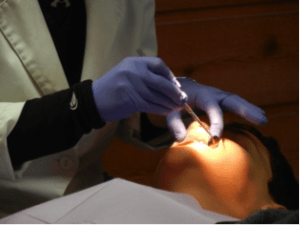June 30, 2015
Gum disease, also known as gingivitis or periodontitis, is bacteria and plaque below the gum line that causes inflammation, irritation and separation between your gums and teeth. Besides causing bleeding, tooth decay and bad breath, inflammation from gum disease can have systemic effects on the rest of your health and well-being as well.
What are the symptoms and signs of gum disease?
- Red, inflamed or bleeding gums after brushing or flossing
- Bad breath or strange tastes in your mouth
- Gums that recede up or away from your teeth
- New spaces between teeth, loose teeth or teeth that just ‘feel different’ when you bite or chew
Sometimes your dentist is the first to notice any gum disease symptoms. During a check-up, your dentist will use a thin periodontal probe to measure the space between your teeth and gums.
Some symptoms your dentist may notice include:
- Probe pocket depths of more than 3 mm
- Bleeding during periodontal probing
- Loss of attachment between the gums and teeth
How common is gum disease in the U.S.?
Gum disease has two main stages: gingivitis and periodontitis. The Centers for Disease Control and Prevention says that in 2010, 47 percent of Americans had at least mild periodontitis. Additionally, Adults over 65 years old had a 65 percent chance of having at least moderate periodontitis. The study showed that men and smokers were at the highest risk for obtaining gum disease.
Great brushing and flossing habits are vital to preventing gingivitis and periodontitis. However, there are other risk factors. Hormonal changes, such as pregnancy and menopause, can change how your gums heal. Cancer, HIV and diabetes can also change how all tissues in the body heal themselves, especially the gums. In addition to hormonal and health changes, smoking and chewing tobacco can damage the gum tissues as well, giving bacteria the opportunity to invade more effectively.
What happens if you do not treat gum disease?
Untreated gum disease leads to tooth loss, serious tooth root decay and bone loss in the jaw.
The effects of gum disease also go beyond your mouth. The National Institutes of Health found recently that there is a possible connection between periodontitis and systemic inflammatory diseases like rheumatoid arthritis, heart disease and worsening diabetes symptoms.
What can you do if you have some of these symptoms?
The prognosis is usually excellent if gum disease is found early and treated effectively. At the gingivitis stage, practicing better oral hygiene habits, eating an inflammation-lowering diet including green tea, whole grains and omega-3s and practicing other home-based remedies such as warm salt-water rinses or gently brushing with baking soda will all help treat this disease.
Once gum disease gets to the periodontitis stage, treatment includes professional scaling and planing the teeth. Gum pockets are not able to heal and connect to the tooth again if tartar and bacteria deposits are still present. Severe periodontitis may require a surgical treatment to fully clean all the way to the root structure. Regular check-ups and cleanings will give you and your dentist the chance to catch and treat gum disease before it ruins your smile and your overall health. Contact us today to make an appointment to keep your teeth and gums healthy for a lifetime.



